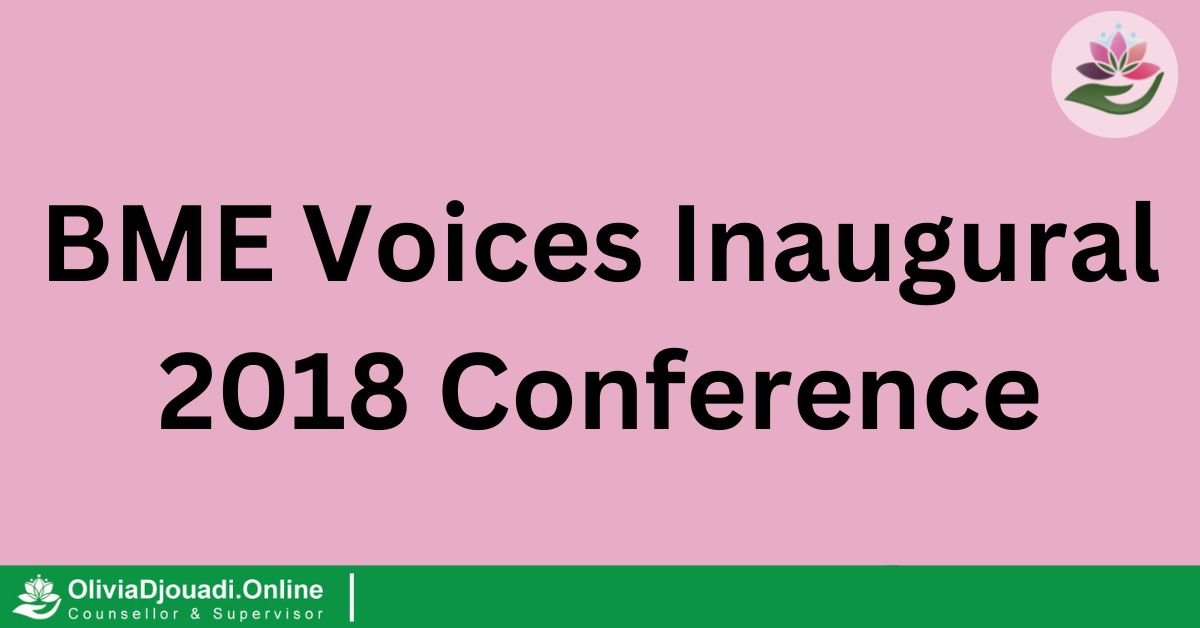
BME Voices inaugural 2018 conference
As a UKCP Muslim practitioner and UKCP trustee candidate, I felt it was important to attend the first conference of Black and Minority Ethnic (BME) Voices founded by Helen George. Her work along with colleague brought speakers together on a range of topics affecting the BME community. The speakers included Dr Patrick Vernon OBE, Dr Erica Mapule McInnis, Dr Dwight Turner, Dr Yetunde Ade-Serrone, Faisal Mahmood, Myira Khan which ended with a plenary talk with those just mentioned. It was an excellent day and when the next one occurs next year I would encourage colleagues working in the psychological field to attend. As a UKCP psychotherapist I did jump in to represent our group as there were already the BACP and BPS who were supporting this educational and eye-opening day.
Helen George the founder of BME Voices Talk Mental Health introduced the day explaining the necessity of needing a space so those in the community can discuss both the background histories and different ways of working with those from the BME community. Most of our psychological knowledge taught comes from either white European or white American clinicians. This means we miss how family dynamics and culture works in other communities. Its not about deleting what we were talk but adding to it so it is more inclusive to all communities.
Dr Patrick Vernon who has spoken widely about the Windrush generation gave a historical and present view of those in this community. Later when requirements changed people from this generation were put through awful dynamics even though they had contributed greatly to the UK filling the jobs like within the NHS so each of those in the UK society could improve their own lives. As someone who didn’t know much about the Windrush history I understood the anger that was felt and the uncertainty for those involved.
Dr Erica Mapule McInnis spoke on Thy Afrikan Self and Afrikan psychology because what might assist a white western client may need to be adjusted to suit the needs of those in the BME community. She discussed the importance of the changes needed and also showed some of the techniques she uses such as the various selves one may hold such as ancestral, contemporary, landed etc and looking at what a client maybe holding. She also the 7Bs – Being, Becoming, Belonging, Believing, Beholding, Bonding, and Behaving; you can find out more about these from the work she does. She also introduced therapy cards which are useful in sessions called Adinkra Cards which could be useful no matter what community or colour you belong to.
Dr Dwight Turner spoke on Voices of the Other and discussed the privilege, supremacy and death of the authentic self. He also discussed both the conscious and unconscious self on the effect of white supremacy. He spoke of the difference that those from the white community and non-white community face which is seen both in the news and our clients. This means those who are white are less likely to be questioned by the police or accused before facts are known. It does leave a mark that can question one’s trust. Ideas are changing thanks to those advocating a fair system however its still a work in process.
Dr Yetunde Ade-Serrone spoke just before lunch on Me, who and what I am _ is human; Reframing my identity within an AfroEuroMultiSocioEconomic and cultural world. She spoke of her own experience and how both ourselves and our clients can really look at who we are today. Jean-Paul Sarte was mentioned as he had said ‘Freedom is what we do to what is done to us’ and ‘We are our choices’ so seeing who we are is in every community no matter where one is from. It was of interest to hear of the many facets one needs to consider.
Faisal Mahmood spoke first in the afternoon about working with Muslim clients and Islam a religion of peace and terror. Due to various events widely shown on the news those in the Muslim community has had to be at times quite careful. I’m aware that at times questions are raised to anyone who maybe Muslim about why negative stories in the news have happened. Approximately 25% of the world’s population are Muslim which means as a Muslim we don’t know why a person may act a certain way in either our own country or another. As someone who is white I have no idea or information on why school shootings happen in America yet no one has questioned me on it. There are more similarities between Muslim’s and non-Muslims than people realise however in a counselling room their may be more to think about which was discussed in Faisal’s talk.
Myira Khan who founded the Muslim Counselling and Psychotherapeutic Network (shown in the picture) spoke on when two cultures present in the therapy room. She discussed both culture and identity which reviewed gender, ethnicity, culture, religion, ethics/values, age, nationality, family dynamics and language. She also discussed what may be seen (20%) and unseen (80%) in a counselling room. It was useful to hear the reasons why people who are Muslim maybe uncomfortable seeking counselling and about issues they may want to talk about which was similar to what others speak of such as depression and others like honour/shame which may be present.
The day ended with a plenary discussion of everyone on the panel which questions were answered with questions from the audience. I walked away thinking this conference ought to be a CPD requirement for anyone in clinical practice. It was excellent and I hope to attend more in the future.
Information can be found at http://www.bmevoices.co.uk/ @bmevoices
